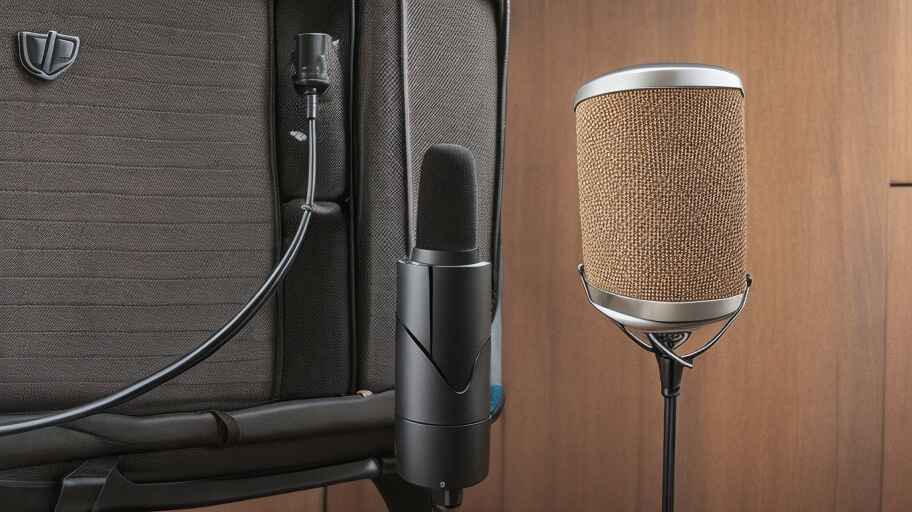Tired of your mic making you sound like a chipmunk on helium? Fear not, because we’ve got the lowdown on how to make your voice deeper on mic!
From simple tricks to secret techniques, we’ve got your vocal cords covered. Ready to unleash your inner radio god? Let’s dive in!
Why You Might Want a Deeper Voice

Before we dive into the techniques and equipment that can help you achieve a deeper voice on a microphone, let’s first understand why having a deeper voice might be on your radar.
1. Conveying Authority and Confidence
A deeper voice often conveys authority and confidence. In professional settings, such as boardrooms and public speaking engagements, a deep voice can command attention and respect.
It can make you sound more self-assured, leading others to perceive you as a knowledgeable and trustworthy individual.
2. Enhancing Your Artistic Expression
For singers and voice actors, a deeper voice can expand your range and allow you to explore different tones and emotions.
It can be a valuable tool for conveying a wide range of characters and moods in your performances.
3. Broadcasting and Podcasting
In the world of broadcasting and podcasting, a deep voice can be a broadcaster’s golden ticket.
It can make your voice stand out from the crowd, drawing in more listeners and making your content more memorable.
What Makes a Voice Sound Deeper?
Achieving a deeper voice on a microphone isn’t just about having a resonant tone; it involves a combination of factors, both physical and technical.
1. Vocal Cord Length
The length of your vocal cords plays a crucial role in determining the pitch and depth of your voice.
Longer vocal cords tend to produce deeper sounds, while shorter ones produce higher-pitched voices.
2. Vocal Cord Tension
The tension in your vocal cords also affects your voice’s pitch. When your vocal cords are relaxed, your voice tends to sound deeper.
Tensing your vocal cords can produce higher-pitched sounds.
3. Resonance
Resonance refers to the way sound waves travel through your vocal tract, amplifying certain frequencies.
Achieving a deeper voice often involves optimizing the resonance of your vocal tract to enhance the lower frequencies.
4. Breathing Technique
Proper breathing technique, specifically diaphragmatic breathing, can help you control the airflow needed to produce a deeper voice.
Breath support is essential for maintaining a steady and resonant tone.
Essential Equipment for Deepening Your Voice

When it comes to altering your voice on a microphone, having the right equipment at your disposal is paramount.
Let’s break down the essential gear required to achieve that coveted deep voice.
Microphones and Equipment
Choosing the right microphone can make a world of difference in how your voice is captured. Here are some microphone options to consider:
1. Dynamic Microphones
Dynamic microphones are known for their ability to capture deeper tones effectively.
They’re often used by broadcasters and podcasters to achieve that authoritative and resonant sound.
2. Condenser Microphones
Condenser microphones excel at capturing a wide range of frequencies, making them suitable for singers and voice actors aiming for depth and clarity in their recordings.
3. Shotgun Microphones
Shotgun microphones are highly directional and excel at picking up sound from a specific source while minimizing background noise.
They are ideal for capturing a deep voice with minimal interference.
Software, Plugins, and Mobile Apps
In addition to choosing the right microphone, you can enhance your voice with the help of software, plugins, and mobile apps.
These tools can modify your voice in real-time or during post-production, giving you greater control over your sound.
1. Voice Processing Software
Voice processing software, such as Adobe Audition and Audacity, allows you to apply effects like pitch shifting and equalization to achieve a deeper voice.
2. Vocal Plugins
Vocal plugins like Auto-Tune and Melodyne can subtly adjust the pitch and timbre of your voice, helping you achieve a smoother and deeper tone.
3. Mobile Apps
Several mobile apps are designed for voice modulation, making it convenient to deepen your voice on the go.
Apps like Voicemod and Voloco offer real-time voice transformation options.
Choosing the Right Equipment
Selecting the appropriate equipment can be a daunting task, given the plethora of options available. Here’s a step-by-step guide to help you make informed choices:
1. Identify Your Goals
Start by defining your objectives. Are you a podcaster aiming for a captivating broadcast voice, or a vocalist looking to add depth to your singing? Your goals will dictate your equipment needs.
2. Consider Your Budget
Determine how much you’re willing to invest in your audio setup. High-quality microphones and software can vary significantly in price.
3. Do Your Research
Read reviews, watch video demonstrations, and seek recommendations from experts in your field.
Knowing the experiences of others can help you make an informed decision.
4. Test Before You Buy
Whenever possible, try out different microphones and software to see which ones work best for your voice and intended purpose.
5. Seek Professional Advice
If you’re uncertain about your choices, consult with audio professionals or sound engineers who can provide valuable insights and recommendations.
With the right equipment in hand, it’s time to delve into the techniques that will help you achieve a deeper voice on the microphone.
Techniques to Achieve a Deeper Voice

Modifying your voice isn’t solely about the equipment you use; it also involves mastering various vocal techniques and exercises. Let’s explore these techniques in detail.
Vocal Techniques
1. Pitch Control
Practice controlling the pitch of your voice by consciously raising or lowering it.
Start by speaking in your natural voice and gradually adjust the pitch lower over time.
2. Articulation and Pronunciation
Clear articulation and precise pronunciation can make your voice sound deeper and more authoritative. Enunciate your words and avoid speaking too quickly.
Vocal Coaching
If you’re serious about achieving a deeper voice, consider working with a vocal coach.
A coach can provide personalized guidance and exercises tailored to your unique voice and goals.
Vocal Exercises
1. Diaphragmatic Breathing
Mastering diaphragmatic breathing is fundamental for voice depth.
Practice breathing deeply from your diaphragm rather than shallow chest breathing.
2. Humming Exercises
Humming at a lower pitch than your usual speaking voice can help you develop control over your vocal cords and deepen your voice over time.
3. Resonation Techniques
Experiment with resonance exercises to amplify the lower frequencies of your voice.
These exercises can include humming while focusing on different parts of your head and chest.
4. Control Your Pace
Speaking slowly and deliberately can make your voice sound deeper and more commanding.
Avoid rushing your words, and use deliberate pauses for emphasis.
Deepen Your Voice Naturally
Lastly, it’s important to remember that deepening your voice should be a gradual process.
Rushing to achieve a deep voice can strain your vocal cords and result in vocal fatigue.
Be patient and consistent in your efforts, and let your voice deepen naturally over time.
Proper Hydration and Dietary Changes
Ensuring your voice is at its best requires more than just vocal exercises and equipment. One often overlooked but critical aspect is hydration and dietary choices.
In this section, we’ll delve into the impact of hydration on your voice quality and explore how different factors can influence the depth of your voice.
Stay Hydrated
Hydration is the cornerstone of maintaining vocal health and achieving optimal voice quality.
Your vocal cords, like any other part of your body, rely on adequate moisture to function effectively.
When your vocal cords are well-hydrated, they vibrate more smoothly, resulting in a clearer and more resonant voice.
The Impact of Hydration on Your Voice
1. Lubrication
Proper hydration ensures that your vocal cords remain lubricated.
This lubrication reduces friction during vocal cord vibrations, preventing strain and potential damage.
2. Vocal Cord Swelling
Inadequate hydration can lead to vocal cord swelling, which can negatively impact your voice quality.
Swollen vocal cords can make your voice sound hoarse and less resonant.
3. Mucus Production
Hydration also influences mucus production in your throat.
When you’re well-hydrated, your body can produce thin, clear mucus that doesn’t interfere with your vocal cords.
Dehydration can lead to thicker, stickier mucus that can affect your voice.
To maintain optimal hydration:
- Drink plenty of water: Aim to drink at least 8 glasses (64 ounces) of water daily.
- Limit caffeine and alcohol: These substances can have a dehydrating effect on your body, so consume them in moderation.
- Use a humidifier: If you live in a dry climate or during the winter months when indoor heating can dry out the air, using a humidifier can help keep your vocal cords moist.
Now that we’ve covered the importance of hydration, let’s explore the different types of voices and what influences their depth.
Different Types of Voice
1. Head Voice
The head voice is characterized by higher-pitched tones.
It resonates in the upper part of your vocal range and is often used in singing to reach high notes with clarity and precision.
2. Chest Voice
Conversely, the chest voice is deeper and resonates in your chest.
It is associated with lower-pitched tones and is often used to convey authority and depth in speaking and singing.
3. Mixed Voice
The mixed voice combines elements of both head and chest voices.
It allows for a seamless transition between different vocal registers, providing versatility in your vocal range.
What Causes Voice to Sound Deep?
Achieving a deep voice involves a combination of factors, both physical and genetic. Let’s explore these factors that influence voice depth.
Factors Influencing Voice Depth
1. Human Anatomy
Your anatomy plays a significant role in determining your voice’s depth.
The length and thickness of your vocal cords, the size of your vocal tract, and the shape of your larynx all contribute to the pitch and resonance of your voice.
2. Age, Size, Body Type, Gender
Several demographic factors can influence voice depth:
- Age: As you age, your vocal cords may naturally thicken, leading to a deeper voice.
- Size and Body Type: Larger individuals may have longer vocal cords, contributing to a deeper voice.
- Gender: Biological differences between males and females result in distinct vocal characteristics, with males generally having deeper voices due to larger vocal cords.
3. Vocal Cords and Diaphragm
Your vocal cords and diaphragm are key players in voice depth.
Well-developed diaphragmatic control and thicker vocal cords can contribute to a deeper voice.
4. Genetics
Genetics also play a role in determining your vocal characteristics.
Your genetic makeup influences the structure and size of your vocal cords, which in turn affects the natural pitch of your voice.
5. Hormones and Testosterone
Hormonal changes, particularly in males during puberty, can result in a deepening of the voice.
The hormone testosterone prompts the growth of the larynx and the thickening of vocal cords.
How to Make Your Voice Deeper on Mic
Microphone Adjustments
To make your voice sound deeper and more resonant on a microphone, start by optimizing your microphone settings.
Proper microphone adjustments can significantly enhance your vocal depth.
1. Mic Gain and Sensitivity
Adjust the microphone’s gain or sensitivity settings.
Lower sensitivity settings can capture deeper tones more effectively and reduce the chances of distortion.
2. Positioning
Experiment with microphone positioning. Move the microphone slightly closer to your mouth while maintaining a consistent distance to capture a richer, deeper tone.
3. Pop Filters and Windscreens
Invest in a pop filter or windscreen to reduce plosive sounds (e.g., “p” and “b” sounds) and control the airflow around the microphone.
This can help maintain vocal clarity and depth.
For a thorough understanding of Play Music Through Your Mic, consult the following articles on Best Quick Reviews: How to Play Music Through Your Mic on Steam? Sync Your Sound
Mobile Apps for Voice Deepening
In the digital age, there are mobile apps designed specifically for voice modulation and deepening.
These apps offer convenience and real-time voice transformation.
1. Pitch Transposer
Apps like “Pitch Transposer” allow you to adjust your voice’s pitch in real time.
Experiment with lowering the pitch gradually until you find your desired depth.
Working with a Vocal Coach
A vocal coach can be an invaluable resource for those seeking to deepen their voice.
They provide personalized guidance and exercises tailored to your unique voice and goals.
1. Vocal Exercises
Vocal coaches can teach you specialized vocal exercises to develop control over your vocal cords and help you achieve a deeper resonance.
2. Breathing Techniques
Mastering proper breathing techniques, such as diaphragmatic breathing, can also be a focus of vocal coaching.
Efficient breath support is crucial for maintaining a resonant tone.
Hormone Therapy & Surgery
For individuals seeking a more permanent solution to voice deepening, hormone therapy and surgery are options to consider.
1. Hormone Therapy
Hormone therapy, often used by transgender individuals, can influence voice deepening by altering hormonal levels.
It is essential to consult with a healthcare professional before pursuing this option.
2. Surgery
In some cases, surgery can be used to physically alter the vocal cords, resulting in a deeper voice.
This option is typically reserved for individuals with specific medical conditions or as part of gender-affirming surgeries.
Finding a Deeper Voice
Discovering your deeper voice is a journey that requires patience and experimentation. Here’s how you can find the right depth for your unique vocal range:
1. Practice
Regular practice is key. Experiment with different pitches and resonance levels during your vocal exercises and daily conversations.
2. Record Yourself
Use audio recording tools to record yourself as you speak or sing at various pitches. Listen to the recordings to identify the depth that suits you best.
3. Seek Feedback
Ask for feedback from friends, family, or colleagues on your vocal tone.
Their perspectives can help you gauge the impact of your voice adjustments.
4. Embrace Your Natural Voice
While it’s essential to explore and develop your vocal range, don’t forget to embrace your natural voice. Authenticity and comfort in your voice are equally important.
Hear It for Yourself
The journey to making your voice deeper on a microphone is an exciting exploration of your vocal capabilities.
Remember that your voice is a dynamic instrument that can adapt and evolve over time.
Whether you’re looking to captivate your audience or simply boost your self-confidence, the power of a deeper voice is within your reach.
Adjust your microphone settings, explore mobile apps, work with a vocal coach, and consider the options that align with your goals.
Most importantly, listen to your voice, appreciate its unique qualities, and let it resonate with the world.
Your voice is your signature, and with the right adjustments, you can make it deeper and more impactful than ever before.
FAQs About How to Make Your Voice Deeper on Mic
How do you get rid of a childish voice?
To address a childish voice, practice vocal exercises that focus on expanding your vocal range and resonance.
Additionally, work on your posture and breathing techniques to develop a more mature tone.
Does humming deepen your voice?
Humming can temporarily relax your vocal cords and may make your voice sound slightly deeper while humming.
However, it won’t bring a long-term deepening effect.
Why are deep voices attractive?
Deep voices are often considered attractive because they are associated with maturity and confidence.
They can convey strength and stability, which many people find appealing.
How can I deepen my voice naturally?
To naturally deepen your voice, engage in regular vocal exercises, maintain good posture, stay hydrated, and avoid straining your voice.
These practices can help your voice develop a deeper tone over time.
How can I make my voice manly?
To make your voice sound more manly, focus on resonance and pitch control.
Speak from your chest rather than your throat, and practice speaking in a slightly lower pitch while maintaining clarity.
Why is my voice so high?
A high-pitched voice can be influenced by various factors, including genetics, vocal cord size, and tension.
It is essential to consult a speech therapist for personalized guidance if you’re concerned about your voice pitch.
How do I stop sounding like a kid?
To stop sounding like a kid, work on your vocal range, articulation, and tone.
Enroll in voice lessons or practice speaking with maturity and confidence.
Why do I sound like a little kid on mic?
Microphones can amplify certain frequencies and may make your voice sound higher or different than how you perceive it.
Practice speaking confidently and clearly to sound more mature on a mic.
Why is my 12-year-old daughter’s voice so deep?
Voice changes during puberty can cause a temporary deepening of a child’s voice.
This is a natural part of development, and her voice may settle into a different pitch as she grows older.
Final Thoughts About How to Make Your Voice Deeper on Mic
In the pursuit of making your voice deeper on the microphone, remember that it’s a journey of self-discovery and enhancement.
Whether you’re a podcaster, singer, or simply someone aiming for a commanding presence, the process involves a blend of technical adjustments, practice, and self-acceptance.
Experiment with microphone settings, explore apps and vocal coaching, but always embrace your natural voice.
Depth in your voice isn’t just about pitch; it’s about authenticity and confidence.
As you embark on this path, relish the richness that comes with each resonant note and remember that your voice, in all its depth, is a powerful instrument waiting to be heard and appreciated.
